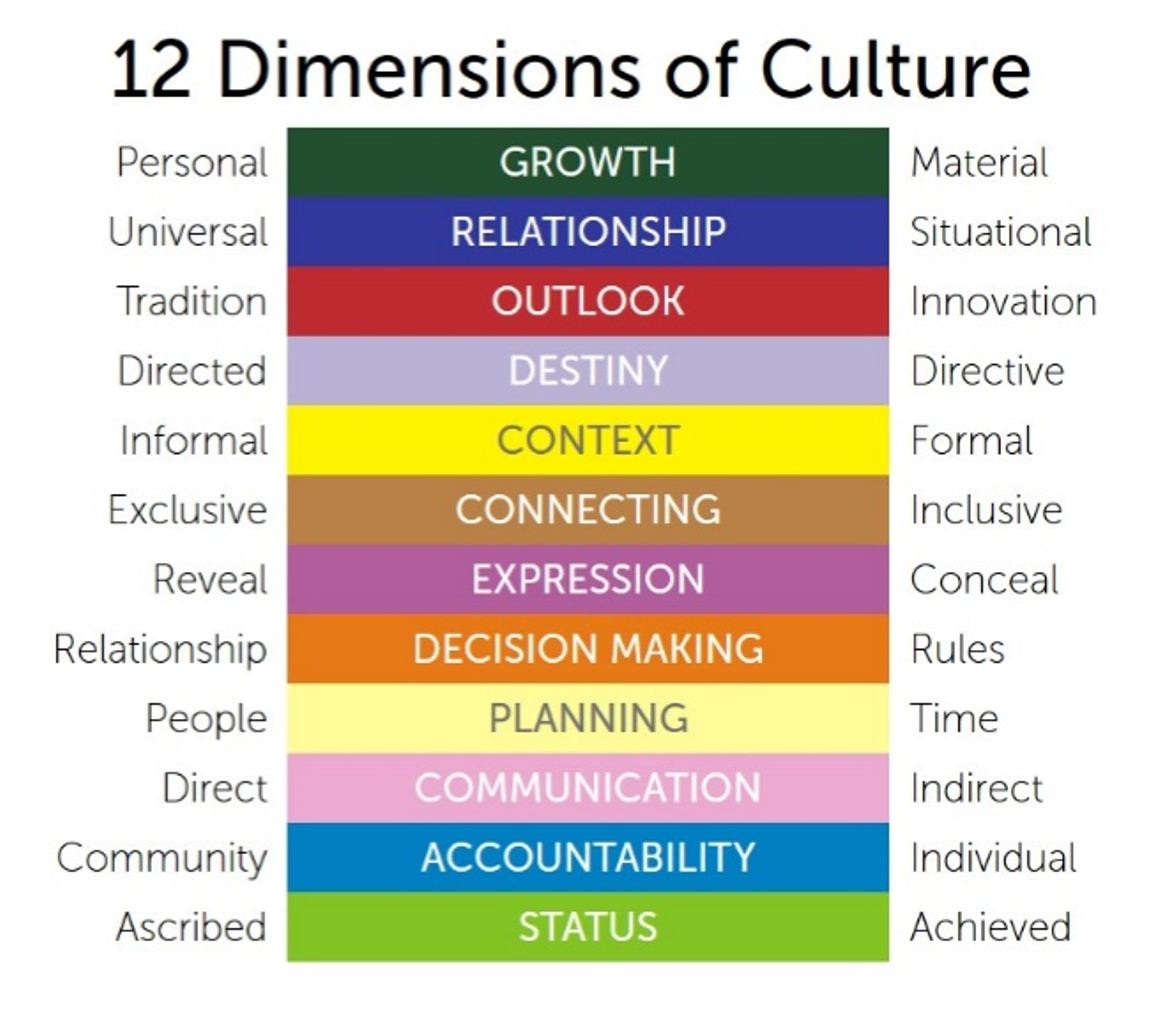Decision-Making is the eighth dimension for mapping our intercultural terrain.
If you’re familiar with cultural theory, you will have come across Trompenaars’ first orientation - highlighting the difference between universalism and particularism. Essentially he asks what is most important in decision-making, the Rules or the Relationships?
Where decision-making is primarily based on relationship, rules are used to serve relationships rather than to restrict them. Decisions are not really based on “the rules” - be they social, legal, or an inner moral compass. Instead decisions are made to use and strengthen relationships, bringing in complex factors that include community, family and tribe.
Where decision-making is rules-based, the tendency is to give weight to external guidelines. Context and the people involved are not nearly so important. North American and Northern European countries lean heavily toward rules-based decision-making. A telling sign of this is the length of contracts and the plethora of legal firms and services found in every business district.
When executives from rules-based cultures move overseas, they are often exposed to relationship-based decision-making. In fact, a majority of the world population operates this way.
Relational capital is referred to as Wasta (Arabic: واسْطة) in the Middle East. Wasta loosely translates as 'clout' or 'who you know'. Similar terms are found across the world, including Blat in Russia and Guanxi in China. Wasta can make what seems impossible a reality: from expediting government paperwork to getting hired or avoiding fines.
Rules vs Relationships: A story from the Automotive Industry
Both rules and relationship-based decision-making can be abused. Where rules are ill-designed, following them too closely causes inefficiency and dysfunction. However, bending the rules for the sake of relationships can also easily turn into corruption or other unethical behavior.
One of the stories related to this has to do with an automotive company in the Middle East. The marketing director was analyzing his dealer network and discovered that one of dealers was not complying with the marketing strategy from the head office in Europe. After he flagged the issue, one of his colleagues who had been in the region for a long time said, "Do you realize that that is probably one of the best dealers we have in the country?" The marketing manager replied, "That's irrelevant. They're out of compliance." To which the first gentleman responded, "Yes, but they are not doing anything illegal. They are simply doing it differently in this context, which is why they're so successful."
The dealership in question had a very strong relationship with its customers. They knew how to bend the marketing rules from Europe in an artful way that allowed them to sell more vehicles than anybody else while avoiding breach of the local law.
In an intercultural environment, you need a healthy balance between rules-based and relationship-based decision-making in order to be successful.

The Role of Contracts
In relationship-oriented cultures, not much time is generally given to drawing up a contract. But in rules-based cultures significant time is spent on getting the contract “right.” Contracts also tend to be much longer. That’s because in rules-based decision-making the contract is what defines the relationship. In relationship-oriented cultures, however, the contract plays a secondary role. It’s the relationship that must be kept on track to ensure success. In a mixed cultural situation, when there are problems with a project in later stages you will hear two different perspectives on what’s happening.
On the rules-based side you will hear rumblings of “Our partners are not sticking to the contract and cannot be trusted.” But on the relationship-based side you will hear “Our partner is not interested in developing our relationship and cannot be trusted.”
This difference in focus can also cause friction when businesses are negotiating sales. In relationship-based decision-making cultures, time and money is invested into maintaining the relationship with the client. Relationships are built on a fabric of entertaining, whether that is taking your clients for dinner, karaoke or paying for coffee. Not entering into this relationship dance of getting to know your partners is considered rude and is a sign you cannot be trusted. But from a rules-based perspective these investments might be viewed as bribes or inappropriate gifts.
We have seen examples where multinational corporations implement “cultural policies” that restrict the amount of money that can be spent on a potential client. This is motivated by a desire to prevent overspending and improper conduct. But it has unintended consequences. On one team we worked with, a senior sales person admitted: “I don’t declare all my expenses. I would rather pay for the odd dinner or coffee myself and continue investing in relationships. If I declared everything I spend, I would be in breach of our cultural policy.”
So what can an organization with rules-based DNA do to ensure success in a relationship-based culture?
Rules-based organizations need to budget for building relationships. Acknowledge and account for the fact that sales require more flexible upfront investment, and that there will be expenses associated with maintaining key relationships. Where contracts are concerned, you may need to be more relaxed about keeping them shorter. Too many clauses can be interpreted as a lack of strength.
Relationships are not built on rules, they are built by people. If yours is a rules-based organization operating multi-nationally, look for ways to give discretion to your local teams while maintaining core guiding principles. Get in touch to discuss how we can help..
* This article originally from KnowledgeWorkx, posted here with permission.
- Log in to post comments






